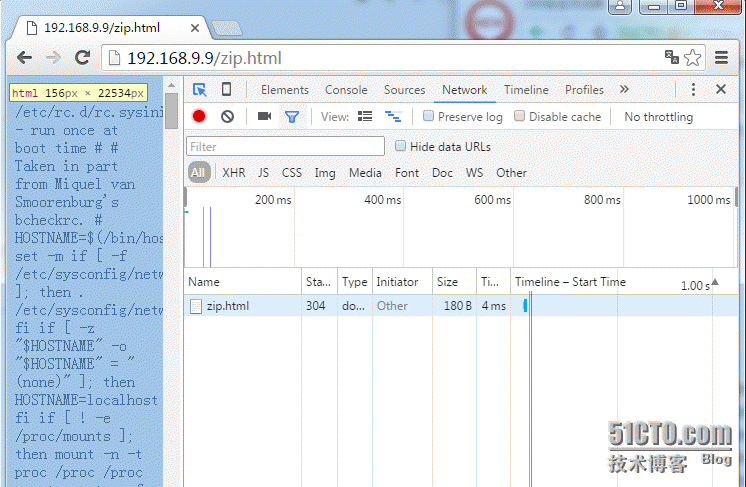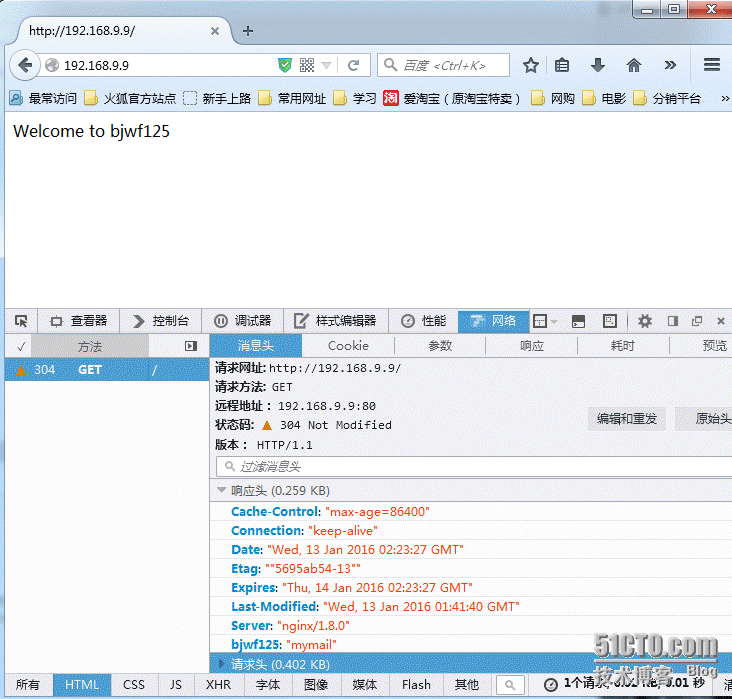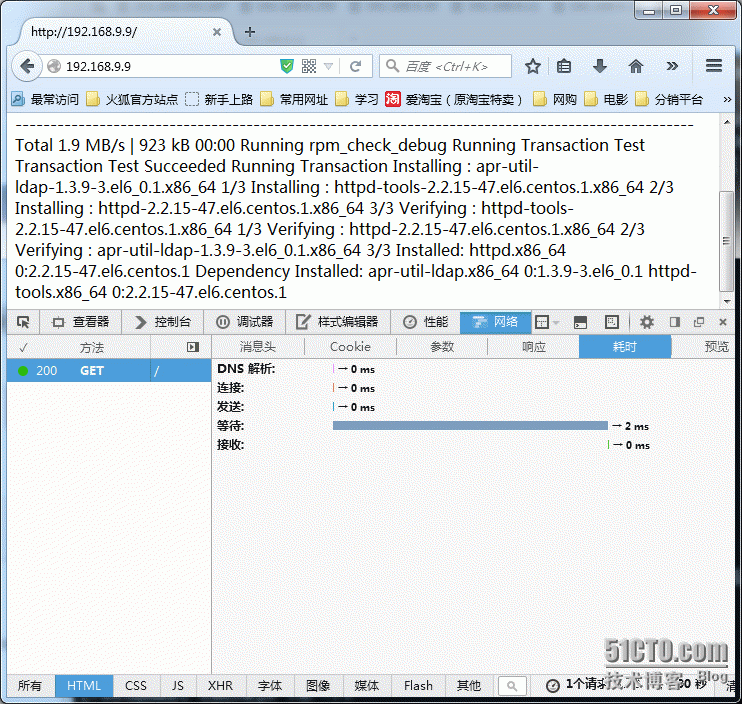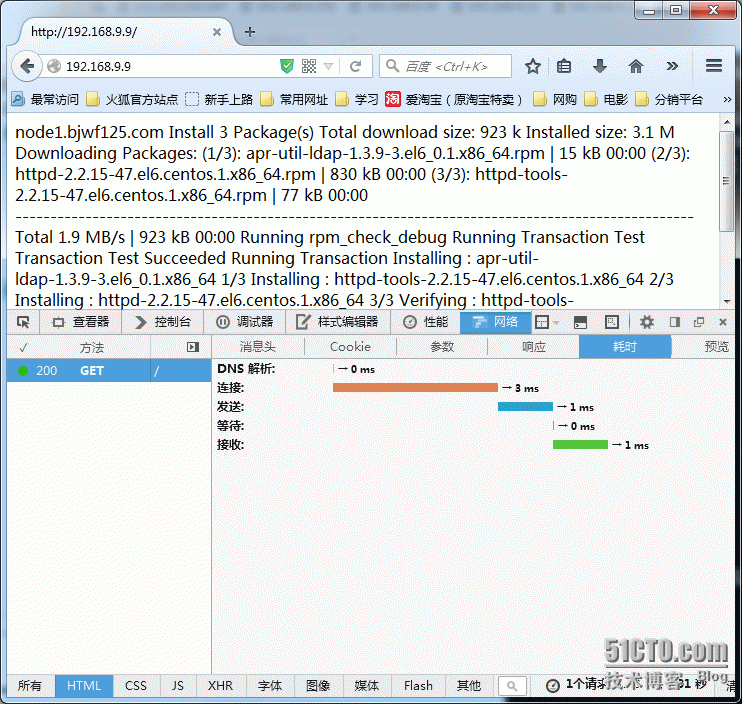Nginx基本使用方法及各模块基本功能
一、Nginx介绍
Nginx是由俄罗斯软件工程师Igor Sysoev开发的一个高性能的HTTP和反向代理服务器,具备IMAP/POP3和SMTP服务器功能,Nginx最大的特点是对高并发的支持和高效的负载均衡,在高并发的需求场景下,是Apache服务器不错的替代品。目前,包括新浪、腾讯等知名网站都已使用Nginx作为Web应用服务器。下面我简单介绍一下:
nginx是一个高性能的Web和反向代理服务器,它具有很多非常优越的特性;
作为Web服务器;相比较与Apache,Nginx使用更少的资源,支持更多的并发连接,体现更高的效率,这点使Nginx尤为受到虚拟主机提供商的欢迎,能够支持高达50000个并发的连接数的响应。
作为负载均衡服务器器:Nginx既可以在内部直接支持Rails和PHP,也可以支持作为HTTP代理服务器对外惊醒服务,Nginx用C语言编写,不论是系统资源开销还是CPU使用效率都比Perlbal要好的多。
作为邮件代理服务器,Nginx同时也是一个非常优秀的邮件代理服务器(最早开发这个产品的目的之一也是作为邮件代理服务器),Last.fm描述了成功并且美妙的使用经验。
Nginx安装非常简单,配置文件非常简介(还能够支持perl语法),Bugs非常少的服务器:Nginx启动特别容易,并且几乎可以做到7*24不间断运行,即使运行数月也不需要重新启动。还能够在不间断服务的情况下进行软件版本平滑升级。
二、软件获得及帮助文档
官方地址:http://nginx.org
下载稳定版本:http://nginx.org/download/nginx-1.8.0.tar.gz
帮助文档:http://nginx.org/en/docs
编译参数说明:http://nginx.org/en/docs/configure.html
三、Nginx的功能
1、Nginx的特性 模块化设计、较好的扩展性 高可靠性:一个master启动一或多个worker,每个worker响应多个请求 低内存消耗:10000个keepalive连接在Nginx中仅消耗2.5MB内存(官方数据) 支持热部署:不停机更新配置文件、更新日志文件、更新服务器程序版本 2、Nginx的基本功能 静态web资源服务器,能够缓存打开的文件描述符 支持http/imap/pop3/smtp的反向代理;支持缓存、负载均衡 支持fastcgi(fpm) 模块化,非DSO机制,支持过滤器zip压缩,SSI以及图像大小调整 支持SSL 3、Nginx的扩展功能 基于名称和IP的虚拟主机 支持keepalive的保持机制 支持平滑升级 定制访问日志,支持使用日志缓存区提高日志存储性能 支持url rewrite 支持路径别名(root或alias指定) 支持基于IP以及用户的访问控制 支持传输速率限制,并发限制 4、Nginx的基本架构 一个master进程,生成一个或者多个worker进程,每个worker响应多个请求 事件驱动:epoll,kqueue,poll,select,rt signals 支持sendfile,sendfile64 支持AIO 支持mmap 5、Nginx模块类型 Nginx core module: nginx的核心模块 Standard HTTP modules:nginx的标准模块 Optional HTTP modules:nginx的可选模块 Mail modules :nginx的邮件模块 3rd party modules:nginx的第三方模块 6、Nginx进程详解 主进程主要完成如下工作: 读取并验正配置信息; 创建、绑定及关闭套接字; 启动、终止及维护worker进程的个数; 无须中止服务而重新配置工作特性; 控制非中断式程序升级,启用新的二进制程序并在需要时回滚至老版本; 重新打开日志文件,实现日志滚动; 编译嵌入式perl脚本; worker进程主要完成的任务包括: 接收、传入并处理来自客户端的连接; 提供反向代理及过滤功能; nginx任何能完成的其它任务; cache loader进程主要完成的任务包括: 检查缓存存储中的缓存对象; 使用缓存元数据建立内存数据库; cache manager进程的主要任务: 缓存的失效及过期检验;
四、Nginx安装配置
1、安装依赖包(CentOS 6.7)
[root@mail soft]# yum -y groupinstall "Development tools,Server platform development,Desktop platform development"
[root@mail soft]# yum -y install pcre-devel openssl-devel
2、编译安装Nginx
[root@mail soft]# tar xf nginx-1.8.0.tar.gz
[root@mail soft]# cd nginx-1.8.0
[root@mail nginx-1.8.0]# groupadd -r nginx
[root@mail nginx-1.8.0]# useradd -g nginx -s /sbin/nologin -M nginx
[root@mail nginx-1.8.0]# ./configure \
--prefix=/usr/local/nginx \
--sbin-path=/usr/sbin/nginx \
--conf-path=/etc/nginx/nginx.conf \
--error-log-path=/var/log/nginx/error.log \
--http-log-path=/var/log/nginx/access.log \
--pid-path=/var/run/nginx/nginx.pid \
--lock-path=/var/lock/nginx.lock \
--user=nginx \
--group=nginx \
--with-http_ssl_module \
--with-http_flv_module \
--with-http_stub_status_module \
--with-http_gzip_static_module \
--http-client-body-temp-path=/var/tmp/nginx/client/ \
--http-proxy-temp-path=/var/tmp/nginx/proxy/ \
--http-fastcgi-temp-path=/var/tmp/nginx/fcgi/ \
--http-uwsgi-temp-path=/var/tmp/nginx/uwsgi \
--http-scgi-temp-path=/var/tmp/nginx/scgi \
--with-pcre
[root@mail nginx-1.8.0]# make && make install
##注意:编译后有些文件夹不会自动创建
[root@mail nginx-1.8.0]# mkdir -pv /var/tmp/nginx/{client,proxy,fcgi,uwsgi,scgi}
mkdir: created directory `/var/tmp/nginx'
mkdir: created directory `/var/tmp/nginx/client'
mkdir: created directory `/var/tmp/nginx/proxy'
mkdir: created directory `/var/tmp/nginx/fcgi'
mkdir: created directory `/var/tmp/nginx/uwsgi'
mkdir: created directory `/var/tmp/nginx/scgi'
这里的二进制文件是直接指定在PATH环境变量里面的,所有可以直接使用,不用导出:
配置vim,使其编辑nginx配置文件时语法着色,默认没有
[root@mail nginx-1.8.0]# cd
[root@mail ~]# mkdir .vim
[root@mail ~]# cp -ra /u01/soft/nginx-1.8.0/contrib/vim/* .vim
[root@mail ~]# ls .vim
ftdetect indent syntax
编写启动脚本:
[root@mail ~]# vim /etc/rc.d/init.d/nginx
#!/bin/sh
#
# nginx - this script starts and stops the nginx daemin
#
# chkconfig: - 85 15
# description: Nginx is an HTTP(S) server, HTTP(S) reverse \
# proxy and IMAP/POP3 proxy server
# processname: nginx
# config: /etc/nginx/nginx.conf
# pidfile: /var/run/nginx.pid
# Source function library.
. /etc/rc.d/init.d/functions
# Source networking configuration.
. /etc/sysconfig/network
# Check that networking is up.
[ "$NETWORKING" = "no" ] && exit 0
nginx="/usr/sbin/nginx"
prog=$(basename $nginx)
NGINX_CONF_FILE="/etc/nginx/nginx.conf"
lockfile=/var/lock/subsys/nginx
start() {
[ -x $nginx ] || exit 5
[ -f $NGINX_CONF_FILE ] || exit 6
echo -n $"Starting $prog: "
daemon $nginx -c $NGINX_CONF_FILE
retval=$?
echo
[ $retval -eq 0 ] && touch $lockfile
return $retval
}
stop() {
echo -n $"Stopping $prog: "
killproc $prog -QUIT
retval=$?
echo
[ $retval -eq 0 ] && rm -f $lockfile
return $retval
}
restart() {
configtest || return $?
stop
start
}
reload() {
configtest || return $?
echo -n $"Reloading $prog: "
killproc $nginx -HUP
RETVAL=$?
echo
}
force_reload() {
restart
}
configtest() {
$nginx -t -c $NGINX_CONF_FILE
}
rh_status() {
status $prog
}
rh_status_q() {
rh_status >/dev/null 2>&1
}
case "$1" in
start)
rh_status_q && exit 0
$1
;;
stop)
rh_status_q || exit 0
$1
;;
restart|configtest)
$1
;;
reload)
rh_status_q || exit 7
$1
;;
force-reload)
force_reload
;;
status)
rh_status
;;
condrestart|try-restart)
rh_status_q || exit 0
;;
*)
echo $"Usage: $0 {start|stop|status|restart|condrestart|try-restart|reload|force-
reload|configtest}"
exit 2
esac
[root@mail ~]# chmod +x /etc/rc.d/init.d/nginx #添加可执行权限
[root@mail ~]# chkconfig --add nginx #添加到服务列表
[root@mail ~]# chkconfig nginx on #设置开机自启动
[root@mail ~]# service nginx start #启动nginx
Starting nginx: [ OK ]
[root@mail ~]# ss -tnl #查看是否监听80端口
[root@mail ~]# ss -tnl
State Recv-Q Send-Q Local Address:Port Peer Address:Port
LISTEN 0 128 *:80 *:*
LISTEN 0 128 :::22 :::*
LISTEN 0 128 *:22 *:*
##查看页面
[root@mail ~]# curl http://localhost
<!DOCTYPE html>
<html>
<head>
<title>Welcome to nginx!</title>
<style>
body {
width: 35em;
margin: 0 auto;
font-family: Tahoma, Verdana, Arial, sans-serif;
}
</style>
</head>
<body>
<h1>Welcome to nginx!</h1>
<p>If you see this page, the nginx web server is successfully installed and
working. Further configuration is required.</p>
<p>For online documentation and support please refer to
<a href="http://nginx.org/">nginx.org</a>.<br/>
Commercial support is available at
<a href="http://nginx.com/">nginx.com</a>.</p>
<p><em>Thank you for using nginx.</em></p>
</body>
</html>
#######################编译安装已经完成。
配置文件介绍
主要有两部分:分别是
main:主体部分
http{}:虚拟主机配置部分
配置指令主要以分号结尾;配置语法:directive value1 [value2 ....]
支持使用的变量
模块内置的变量
自定义变量:set var_name value
主配置段的指令类别:
用于调试和定位问题:
(1)daemon [on|off]: 是否以守护进程的方式启动nginx;
(2)master_press [on|off]: 是否以master/worker模型来运行nginx;
(3)error_log /path/to/error_loglevel: 指明错误日志文件级别,处于调试目的,可以使用debug级别,但次级别只有在编译nginx时使用了--with-debug选项才有效 ;
正常运行必备的配置:
(1)user USERNAME [GROUPNAME]:指定运行worker的用户和用户组;例如 user nginx nginx
(2)pid /path/to/nginx.pid : 指定pid文件
(3)worker_rlimit_nofile # : 指定一个worker进程能够打开的最大文件句柄数
(4)worker_rlimit_sigpending # : 指定每个用户能够发往worker信号的数量
优化性能相关的配置:
(1)worker_processes # :worker进程的个数,通常是cpu核心数减1
(2)worker_cpu_affinity cpuumask :绑定worker进程至指定的CPU上
(3)timer-resolution t :时间解析度,在x86服务器上可以不用配置
(4)worker_priority NICE :调整nice值(-20,19);nice值越大,越优先分配cpu
事件相关的配置;
(1)accept_mutex [on|off] :内部调动用户请求至各worker时的负载均衡锁;启用时表示能够让多个worker轮流的、序列化的响应请求
(2)lock_file /path/to/lock_file :指定锁文件
(3)accept_mutex_delay #ms: 取得负载均衡锁的时间
(4)use [epoll|poll|select|rgsig]:定义使用的事件模型,建议让nginx自动选择
(5)worker_connections #:每个worker进程所能够响应的最大并发请求数
五、Nginx的一些基本功能实现
1、基于用户认证:
(1)、修改配置文件
server {
listen 80;
server_name localhost;
#charset koi8-r;
#access_log logs/host.access.log main;
location / {
root html;
index index.html index.htm;
auth_basic "www.bjwf125.com";
auth_basic_user_file /www/html/.passwd;
}
}
(2)、创建文档根目录以及使用httpd-tools中的htpasswd工具创建用户
[root@mail ~]# mkdir -pv /www/html
mkdir: created directory `/www'
mkdir: created directory `/www/html'
[root@mail ~]# echo "Welcome to bjwf125" > /www/html/index.html
[root@mail ~]# yum -y install httpd-tools
[root@mail ~]# htpasswd -c -m /www/html/.passwd centos #创建centos用户
New password: #输入密码
Re-type new password: #再次输入
Adding password for user centos
(3)、重新载入配置文件
[root@mail ~]# nginx -t #检查Nginx语法
nginx: the configuration file /etc/nginx/nginx.conf syntax is ok
nginx: configuration file /etc/nginx/nginx.conf test is successful
[root@mail ~]# service nginx reload #重新载入

2、基于IP认证
server {
listen 80;
server_name localhost;
#charset koi8-r;
#access_log logs/host.access.log main;
location / {
root html;
index index.html index.htm;
deny 192.168.9.0/24;
allow all;
}
}
3、基于gzip压缩
server {
listen 80;
server_name localhost;
#charset koi8-r;
#access_log logs/host.access.log main;
location / {
root /www/html;
index index.html index.htm;
gzip on;
gzip_http_version 1.0;
gzip_min_length 1000;
gzip_proxied expired no-cache no-store private auth;
gzip_types text/plain application/xml text/css application/x-javascript text/xml
application/xml+rss text/javascript application/javascript application/json;
gzip_disable msie6 safari;
}
}
[root@mail ~]# nginx -t
[root@mail ~]# service nginx reload
[root@mail ~]# cp /etc/rc.d/rc.sysinit /www/html/zip.html
[root@mail ~]# ll /www/html/zip.html -h
-rwxr-xr-x 1 root root 20K Jan 13 10:01 /www/html/zip.html

4、定制响应头部
server {
listen 80;
server_name localhost;
#charset koi8-r;
#access_log logs/host.access.log main;
location / {
root /www/html;
index index.html index.htm;
expires 24h;
add_header bjwf125 mymail;
}
}
[root@mail ~]# nginx -t
[root@mail ~]# service nginx reload

5、URL重定向
语法格式:
rewrite grgex replacement [flages]
flages
last:一旦被当前规则匹配并重写后立即停止检查其他后续的rewrite的规则,而后通过重写后的规则重写发起请求;
bleak:一旦被当前规则匹配并重写后立即停止后续的其他rewrite的规则,而后由nginx进行后续操作;
redirect:返回302临时重定向
permanent:返回301永久重定向
例如:
[root@mail ~]# vim /etc/nginx/nginx.conf
server {
listen 80;
server_name localhost;
#charset koi8-r;
#access_log logs/host.access.log main;
location / {
root /www/html;
index index.html index.htm;
rewrite ^/admin/(.*)$ /web/$1;
}
}
[root@mail ~]# mkdir -pv /www/html/{admin,web}
[root@mail ~]# echo "mail.bjwf125.com" > /www/html/web/index.html
[root@mail ~]# nginx -t
[root@mail ~]# service nginx reload

6、虚拟主机
[root@mail nginx]# vim /etc/nginx/nginx.conf
#注释掉http{}段中的预定义server{}段中的所有内容;
在文件末尾}前一行添加一条:
include conf.d/nginx-vhost.conf;
#方便后面定义,根据个人习惯而已,也可以直接在/etc/nginx/nginx.conf中配置
[root@mail nginx]# vim /etc/nginx/conf.d/nginx-vhost.conf
server {
listen 80;
server_name www.a.com;
location / {
root /www/html/a;
index index.html index.htm;
}
}
server {
listen 80;
server_name www.b.com;
location / {
root /www/html/b;
index index.html index.htm;
}
}
[root@mail nginx]# mkdir /www/html/{a,b} -pv
mkdir: created directory `/www/html/a'
mkdir: created directory `/www/html/b'
[root@mail nginx]# echo "www.a.com" > /www/html/a/index.html
[root@mail nginx]# echo "www.b.com" > /www/html/b/index.html
[root@mail nginx]# vim /etc/hosts
192.168.9.9 www.a.com
192.168.9.9 www.b.com
[root@mail nginx]# service nginx reload
[root@mail nginx]# curl http://www.a.com
www.a.com
[root@mail nginx]# curl http://www.b.com
www.b.com
###虚拟主机最简单的方式已经配置完成,但是虚拟主机里面还有很多参数。
7、防盗链
(1)、定义合规的引用
valid_referers none | blocked | server_names | string ...;
(2)、拒绝不合规的引用
if ($invalid referer) {
rewrite ^/ http://www.b.com/403.html;
}
##具体示例如下:
[root@mail conf.d]# vim nginx-vhost.conf
server {
listen 80;
server_name www.b.com;
location / {
root /www/html/b;
index index.html index.htm;
valid_referers none blocked www.b.com *.b.com;
if ($invalid_referer) {
rewrite ^/ http://www.b.com/403.html;
}
}
}
[root@mail conf.d]# vim /www/html/a/index.html
www.a.com
<img src="http://www.b.com/images/1.jpg"> #在a.com中引用
[root@mail conf.d]# vim /www/html/b/index.html
www.b.com
<img src="http://www.b.com/images/1.jpg"> #b.com自己引用
测试结果:


8、Nginx的反向代理
Nginx可以通过proxy模块实现反向代理功能,在作为web反向代理服务器时,Nginx复制接收客户端请求,并能够根据URL、客户端参数或者其它的处理逻辑将用户请求调度至上游服务器上(upstream server)。
Nginx在实现反向代理功能时最重要的指令为proxy_pass,它能够将location中定义的某URI代理至指定的上游服务器(组)上。如下面的示例中,location的URI将被替换为上游服务器上的newURI。
### 例如:
[root@mail conf.d]# vim nginx-vhost.conf
server {
listen 80;
server_name www.a.com;
add_header X-Via $server_addr;
location / {
root /www/html/a;
index index.html index.htm;
}
location = /node2 {
proxy_pass http://192.168.9.11/;
}
}
##上游服务器必须要配置相应服务及页面
[root@mail conf.d]# service nginx reload
[root@mail conf.d]# curl www.a.com
<img src="http://www.b.net/images/1.jpg">
[root@mail conf.d]# curl http://www.a.com/node1
node1.bjwf125.com
(1)、缓存:Nginx作为反向代理时,能够将上游服务器的响应缓存至本地,并在后续的客户端请求同样的内容时直接从本地构造响应报文。具体参数如下:
proxy_cache zone|off:定义一个用于缓存的共享内存区域,其可被多个地方调用;
proxy_cache_path:定义一个保存缓存响应报文的目录,及一个保存缓存对象的键及响应元数据的共享内存区域(keys_zone=name:size),其可选参数有:
levels:每级子目录名称的长度,有效值为1或2,每级之间使用冒号分隔,最多为3级;
inactive:非活动缓存项从缓存中剔除之前的最大缓存时长;
max_size:缓存空间大小的上限,当需要缓存的对象超出此空间限定时,缓存管理器将基于LRU算法对其进行清理;
loader_files:缓存加载器(cache_loader)的每次工作过程使用为多少个文件加载元数据;
loader_sleep:缓存加载器的每次迭代工作之后的睡眠时长;
loader_threashold:缓存加载器的最大睡眠时长;
proxy_cache_valid [ code ... ] time:用于为不同的响应设定不同时长的有效缓存时长,例如:
proxy_cache_valid 200 302 10m;
proxy_cache_methods [GET HEAD POST]:为哪些请求方法启用缓存功能;
proxy_cache_bypass string:设定在哪种情形下,nginx将不从缓存中取数据。
示例:
# vim /etc/nginx/nginx.conf
http {
include mime.types;
default_type application/octet-stream;
proxy_cache_path /data/nginx/cache levels=1:2 keys_zone=STATIC:10m inactive=24h max_size=1g;
server {
listen 80;
server_name node1;
add_header X-Via $server_addr;
location / {
root /www/html/b;
index index.html index.htm;
proxy_pass http://192.168.9.11;
proxy_set_header Host $host;
proxy_cache STATIC;
proxy_cache_valid 200 1d;
proxy_cache_valid 301 302 10m;
proxy_cache_valid any 1m;
proxy_cache_use_stale error timeout invalid_header updating http_500 http_502 http_503 http_504;
}
}
}
[root@mail nginx]# mkdir -pv /data/nginx/cache
[root@mail nginx]# nginx -t
[root@mail nginx]# service nginx reload
缓存前请求时间

缓存后请求时间

####主要文件太小,效果不是太明显,有强迫症的同学可以自己测试。
##此时可以查看缓存目录是否有文件生成
[root@mail ~]# ll /data/nginx/cache/
drwx------ 3 nginx nginx 4096 Jan 13 14:32 1
(2)、负载均衡:Nginx可以利用自身的upstream模块实现,upstream模块的负载均衡算法主要有三种,轮调(round-robin)、ip哈希(ip_hash)和最少连接(least_conn)三种。
upstream模块常用的指令有:
ip_hash:基于客户端IP地址完成请求的分发,它可以保证来自于同一个客户端的请求始终被转发至同一个upstream服务器;
keepalive:每个worker进程为发送到upstream服务器的连接所缓存的个数;
least_conn:最少连接调度算法;
server:定义一个upstream服务器的地址,还可包括一系列可选参数,如;
weight:权重;
max_fails:最大失败的连接次数,失败连接的超时时长由fail_timeout指定;
fail_timeout:等待请求的目录服务器发送响应的时长;
backup:用于fallback的目的,所有服务均故障时才启动此服务器;
down:手动标记其不再处理任何请求;
示例:
# vim /etc/nginx/nginx.conf
http {
upstream web {
server 192.168.9.11:80 max_fails=3 fail_timeout=10s;
server 192.168.9.13:80 max_fails=3 fail_timeout=10s;
server 127.0.0.1:8080 backup;
}
server {
listen 80;
server_name www.c.net;
add_header X-Via $server_addr;
location / {
root /www/html/b;
index index.html index.htm;
proxy_pass http://web;
}
}
server {
listen 8080;
server_name 127.0.0.1;
location / {
root /www/html/b;
index index.html index.htm;
}
}
[root@mail ~]# curl http://www.c.net
192.168.9.11
[root@mail ~]# curl http://www.c.net
192.168.9.13
##停掉上游两台服务器后:
[root@mail ~]# curl http://www.c.net
Sorry
#####Nginx的基本功能基本完成
The end
有关Nginx的基本配置及一般用法就写到这里了,第一次写Nginx的博客,写的比较乱,比较杂,敬请谅解,有什么不对的地方,麻烦朋友们告诉我。以上为个人学习整理,如有错漏,大神勿喷。。。。。